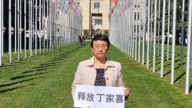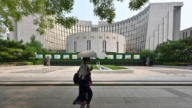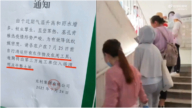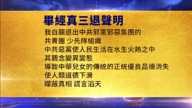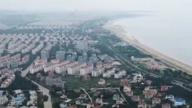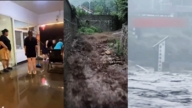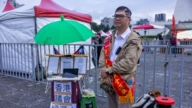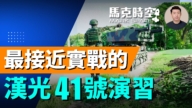【新唐人2011年11月4日讯】最近,在中共国务院限购、限价、限贷等强硬政策下,降价潮逐渐席卷了整个中国楼市。不过,接踵而来的是土地市场的急速降温、地方政府土地财源的骤减。这让长期以土地出让金为财政收入来源的地方政府一下子变成窘迫不堪,它们将如何应对这一难题呢?我们听聼专家的分析。
中国广东城市珠海,刚刚在11月1号推出“双限”政策,尽管让众多开发商为之心寒,然而更深层的难题,可能是楼市低迷所带来的政府土地财政问题。
《第一财经日报》披露,从公开资料显示,下半年以来,珠海土地市场不断出现土地流拍现象。
《南方都市报》则从珠海市财政局了解到,珠海前三季度土地出让金与预期相比差距很大,年初预计土地出让收入可达88亿元,按目前的情况,市财政将调整预算到50多亿元,减少了30多亿。
去年前10月,珠海市土地使用权出让金收入203.9亿元,约占当地GDP的24%,同比增长14倍。《第一财经日报》分析,按照今年土地收入增幅程度来看,到今年10月市本级土地使用权出让金收入能到100亿元都不容易。
一直以来,中国各省和各城市政府缺乏其他稳定的财政收入来源,严重依赖出让土地收入,经常将农用地通过拍卖形式出让给房地产开发商。
《路透社》援引了上海一家民间投资顾问公司莫尼塔(CEBM)的分析师乔永远的看法,他认为:“随着土地出让收入明显减少,中国多数城市的财政收入基数可能逐渐缩小。”
那么被隔阻了土地财源的地方政府新的可持续收入来源在哪里呢?
纽约市立大学经济学教授陈志飞认为,地方政府会采取征收税金的办法来弥补部分财政收入。
纽约市立大学经济学教授陈志飞:“将来的中国整个的运营环境、经济领域,它的税收情况会有很大的改变。而且地方的税收会有大幅度的增加。这一块,我估计就是地方政府会采取举措来改变它,以土地转让金减少而造成的财政损失,中央政府与地方政府最后也会达成一个默契,我把你的土地转让金、房产这块损失,我会用睁一只眼,闭一只眼的办法来让你乱征各种税金来弥补,我想这个是一个可能发生的情况。”
最近,浙江湖州发生万人抗税事件引发各界关注。陈志飞认为,这起事件已经体现出大陆地方财政在地皮转让这方面收入减少,转而征收以地方命名的各种附加税来弥补财政来源。
此外,目前已经在上海、深圳试行的“地产税”也会让地方政府增加财政收入。不过,陈志飞认为,增收税金并不能完全弥补地方财政。
纽约市立大学经济学教授 陈志飞:“地方财政肯定会紧缩,这是中央与地方博弈的主要部分。因为它们(中共中央)发现,这个实际是地方做大,还有经济泡沫形成的主要来源,这样下去的话,矛盾会加剧,而且这个经济泡沫会把邪党的体制崩掉。这也是所谓经济过热带来的问题,那么经济过热实际上是虚假的,虚拟的,泡沫型的,所以说,外界已经预计到,今年的经济发展可能还会增长达到9.5%左右,但是,在两三年内它会降到6%。”
对中共出台的楼市调控政策,美国《华尔街日报》3号的文章援引分析师和开发商的分析说,由于中共政府实施抗通胀政策导致银行信贷收紧,经济整体放缓,投资者在房价多年稳步上涨后变得谨慎起来,中国楼市前景正在变坏。
分析认为,珠海“限购令”凸显楼市政治压力,随着明年中共18大召开,楼市受到了更多的审视,因为如果到那时候房价仍高不可攀,似乎就说明共产党没有能力保障广大民众的生活。
新唐人记者梁欣、李静、张健采访报导。
CCP Local Authorities Face Plight of Land Revenue
Recently, State Council of Chinese Communist Party
(CCP) authorities released tough policies such as limiting home purchase,
limiting prices and limiting loans etc..
a wave of price cuts swept through China’s property market.
However, land market cooling-down ensued as well as
slump land revenues for the CCP local authorities, which
has long-term relied on the income of land sales,
suddenly trapped in a sorry plight
How will CCP local authorities cope with such a dilemma?
Let’s see experts’ analysis.
An official “double-limiting" policy on property market was
just launched on November 1st in Zhuhai, Guangdong,
bringing chilling to many property developers.
However, a more deep-seated tough question might be
focused on the land financial problem, triggered by the property market downturn.
First Financial Daily reveals that publicly available data show
since the second half of this year, the land market in Zhuhai kept failing land auctions.
Southern Metropolis Daily reports quoted official data that
revenues from land sales in the first three quarters differed greatly from the expectation.
In early 2011, land sales revenues were expected to reach
RMB 8.8 billion. Based on the present situation,
the Municipal Bureau of Finance will have to lower the budget
by RMB 3 billion, to RMB 5 billion.
The first ten months of 2010, revenues from land sales
in Zhuhai were RMB 20.39 billion, about 24% of local GDP.
A year-on-year increase of 14 times.
First Financial Dail analyzed that,
according to this year’s growing rate of land revenue,
it is hard to reach RMB10 billion by this October.
All along, China’s provincial and municipal authorities lack
other stable sources of fiscal revenues.
They have been heavily relying on revenues of land sales.
Agricultural lands are often sold to real estate developers
through auctions.
Reuters quoted Qiao Yongyuan, an economist
at the CEBM Group in Shanghai, saying,
" with obvious declining of land revenues,
the total fiscal revenues of most cities in China might be gradually diminished.”
Where are new sustainable sources of fiscal incomes for CCP’s
local authorities?
Chen Zhifei, a professor of economics at the City University
of New York, believed that local authorities will levy taxes to offset part of its fiscal revenues.
Chen Zhifei: “In the future, the entire operating environment,
economy and tax collection in China, may vary greatly.
Local authorities may substantially increase taxes.
I think that they will take measures to offset the losses
caused by diminished land revenues,
and will finally reach a tacit agreement with
CCP Central authorities.
The latter will turn a blind eye to local authorities’ levying
various taxes. I think this is likely to happen. “
Recently, a mass tax-resistance incident broke out
in Huzhou, Zhejiang, drawing public attentions.
Chen Zhifei commented that the incident unveiled that
CCP local authorities’ land revenues have diminished.
Thus they levied other various local additional taxes
to make up their financial sources.
What’s more, the property tax, currently piloted in Shanghai
and Shenzhen, will increase local authorities’ fiscal revenues.
However, Chen Zhifei believed that tax increment will not
fully compensate local fiscal finance.
Chen Zhifei: “The local fiscal finance will certainly be tight.
This is the major part of game played between CCP’s
central authorities and local authorities.
CCP central authorities found that land revenues not only
helped local authorities to be stronger in terms of finance, but also the major source of economic bubble.
If it goes on, conflicts will increase, and the economic bubble
will make CCP’s whole system collapse.
That is the so-called problems caused by
overheated economy.
In reality, the overheated economy is fabricated
and fictitious, a bubble.
So it has been estimated that China’s economic
grow rate will be 9.5% this year.
But within two or three years,
it will be dropped down to 6%. “
After Zhuhai issued an official home purchase limited policy,
the Wall Street Journal’s article dated November 3,
quoted analysts and developers as saying that
CCP’s anti-inflationary policies led to tight bank credit, the overall economy has slowed down.
Investors have become cautious after years of steady
upward housing prices.
China’s property market outlook is worsening.
Analysts say that Zhuhai’s official limiting order exposed
CCP put political pressure on the property market.
With the upcoming 18th CCP Congress in 2012,
more attention are focused on China’s property market.
If housing prices are still sky high in next year, it seems
showing that CCP has no capability to assure civilians’ lives.
NTD reporters Liang Xin, Li Jing and Zhang Jian


